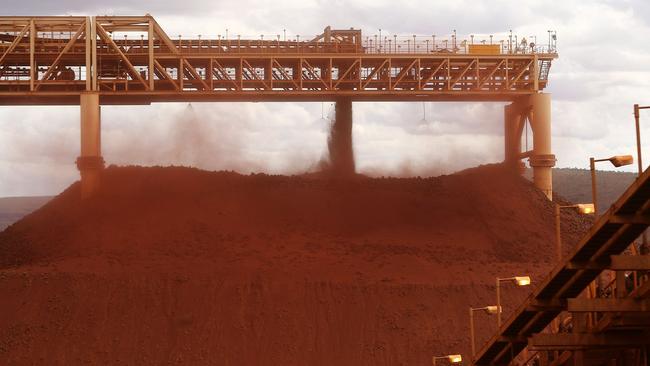
Just to put that number into context, in the federal budget this year the assumed price for iron ore was $US55 a tonne.
Moreover, a buoyant resources sector is also providing the local sharemarket with a welcome balance to overheated technology and healthcare stocks: strong prices for resource giants BHP and Rio are underpinned by iron ore, while “pure play” Fortescue is up 85 per cent over the last 12 months.
So what’s stopping Beijing reaching for the biggest stick of all?
Here’s the Australian trade equation — iron ore is our jewel in the crown. It represents 40 per cent of all commodity exports. In turn, toughly 85 per cent of our iron ore goes to China
If China cuts us out, we would clearly be in deep trouble.
Here’s the China trade equation — about 60 per cent of iron ore coming into China comes from Australia. Iron ore mines within China can barely provide 15 per cent of its domestic needs.
Sure, there are alternative sources beyond Australia: the biggest is Brazil supplying 20 per cent of China’s imports, but Brazil is struggling to even keep up routine delivery at the moment as problems continue at its biggest producer, Vale.
If Australia cuts out China, China is in deep trouble, too.
“It’s a two-way street: China uses Australian iron ore for infrastructure, property, manufacturing — everyone has been surprised at the speed of the rebound, but the key issue is that there is a co-dependence there,” says Vivek Dhar, director of mining and energy commodes research at Commonwealth Bank.
Iron ore is now up about 50 per cent over 12 months driven by China’s steel sector and underlying demand for white goods: in fact, the demand out of China is only matched by the construction boom in 2014 when prices were last at these levels.
Overall, China buys about 70 per cent of the world’s seaborne iron ore. But the problem for Beijing is that it is a finely balanced market — change anything and there are consequences. Market economics dictate that if China cuts out Australia — or even cuts back on Australian iron ore — the already elevated iron ore price will rise.
This is not the case for other commodities such as coal where the sources are much more varied. Moreover, China has its own coal, providing up to 80 per cent of domestic needs.
As we have come to expect, the forecasts for iron ore are for lower prices towards the end of next year — though nowhere near as low as the Australian government has pencilled into the budget.
Analysts expect the infrastructure boom in China to cool, they expect Beijing to start lifting its usage of scrap metal, and prices may move back below $US100 a tonne again. But forecasters for iron ore prices rarely get it right — it can drop like a stone (remember $US40 in 2016) or soar higher, as it has done in the second half of this year.
The reality is that analysts across the industry suggest any moves to cut back on Australian iron ore supply will immediately push prices even higher: Such a development can’t be ruled out, but in contrast to the moves on wine or coal, it would hurt China’s own economy: as such, it remains unlikely.






As China blockades threaten everything from coal to wine, national revenues from iron ore are more important than ever — and the metal’s price is riding on a six-year high of $US132 a tonne.